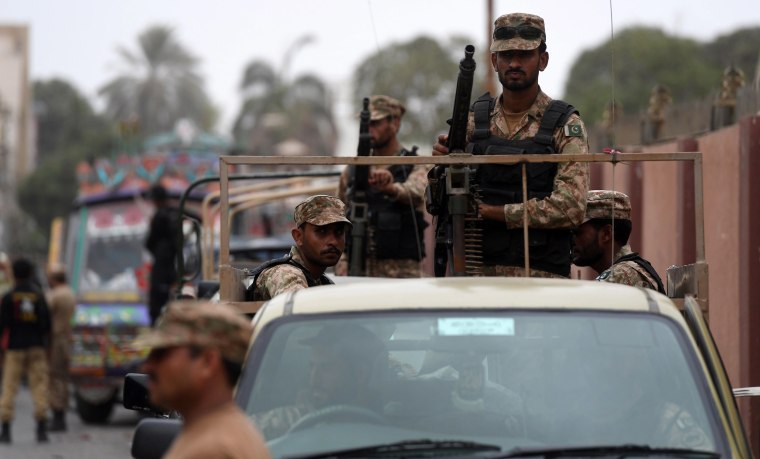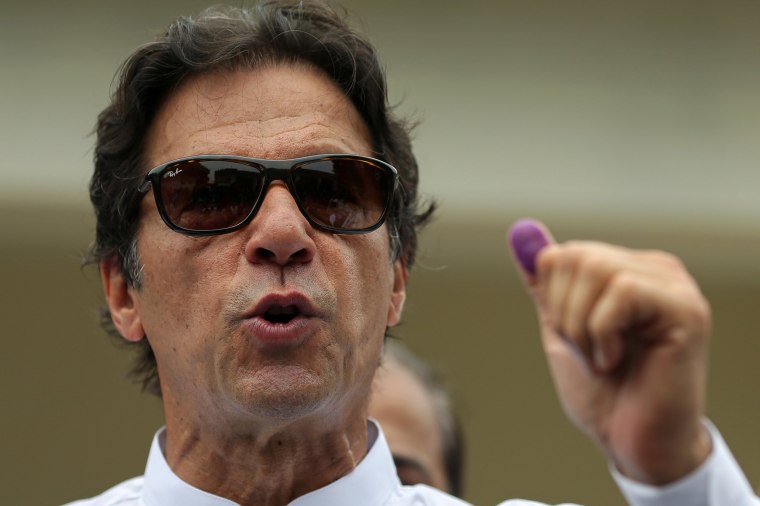A blast near a polling station killed dozens of people Wednesday as Pakistan voted in a general election pitting cricket hero Imran Khan against the party of jailed ex-Prime Minister Nawaz Sharif.
The attack in Quetta killed 31 people and wounded 35 others, hospital official Jaffar Kakar told the Associated Press.
The election will be only the second civilian transfer of power in nuclear-armed Pakistan's history.

About 371,000 soldiers have been stationed at polling stations across the country to prevent attacks, nearly five times the number deployed at the last election in 2013.
Earlier this month, a suicide bomber killed 149 people at an election rally in the town of Mastung, Baluchistan — an attack claimed by Islamic State militants.
According to the latest opinion polls, neither Khan nor Sharif's younger brother Shahbaz — who took control of the right-of-center Pakistan Muslim League — are likely to win a clear majority. Nawaz Sharif was sentenced to 10 years in prison on corruption charges earlier this month.
Khan has emerged as a slight favorite in national opinion polls. The election has been plagued by allegations the powerful armed forces have been trying to tilt the race in favor of Khan and his right-of-center Pakistan Tehreek-e-Insaf Party.
"Imran Khan is the only hope to change destiny of our country. We are here to support him in his fight against corruption," said Tufail Aziz, 31, after casting his ballot in the northwestern city of Peshawar.
About 106 million people are registered to vote in polls due to close at 6 p.m local time (8 a.m. ET). The likely winner should be known by around 2 a.m. Thursday (4 p.m. Wednesday ET).
Early voting was heavy at some polling stations in Islamabad, the capital, and also in the Punjab provincial capital, with several political party leaders standing in line to cast their ballots. Local television reported scattered incidences of police arresting people with pre-marked ballots.
Rights groups have warned that a rancorous election campaign and widespread allegations of manipulation imperil the wobbly transition to democratic rule and raise the specter of bitter challenges of fraud after the elections.
The unprecedented participation of radical religious groups, including those banned for terror links but resurrected and renamed, has also raised fears that the space for moderate thought may shrink further in Pakistan.
The third-largest party in the running is the left-leaning Pakistan People's Party, headed by Bilawal Bhutto, the son of late Prime Minister Benazir Bhutto, assassinated by Pakistan's Taliban militants, whom she had vowed to eradicate.
Whichever party wins, it will face a mounting and urgent in-tray, from a brewing economic crisis to worsening relations with on-off ally the United States to deepening cross-country water shortages.
An anti-corruption crusader, Khan has promised an "Islamic welfare state" and cast his populist campaign as a battle to topple a predatory political elite hindering development in the impoverished mostly-Muslim nation of 208 million people, where the illiteracy rate hovers above 40 percent.
"We are pitched against mafias," Khan, 65, said in one of his last rallies in the coastal city of Karachi. "These are mafias who made money in this country and siphoned it abroad, burying this nation in debt."

Khan has in recent years shed his playboy image and adopted a more pious and conservative persona. He has vowed to create 10 million jobs if he comes to power and promised to build "world class" schools and hospitals.
Pakistan's election commission reminded candidates their elections will be nullified if the female voter turnout does not reach 10 percent. The requirement was imposed after the 2013 elections, when several areas banned voting by women, mostly in Pakistan's religiously conservative northwest. Some candidates were elected without a single woman marking a ballot.
The commission issued its reminder Tuesday after veteran rights activist Tahira Abdullah said local jirgas, or councils, of elders from 60 areas of the country, representing 16 different constituencies, had signed agreements banning women from voting.
Results will trickle in after polling ends, with the outcome expected early Thursday, according to election officials.